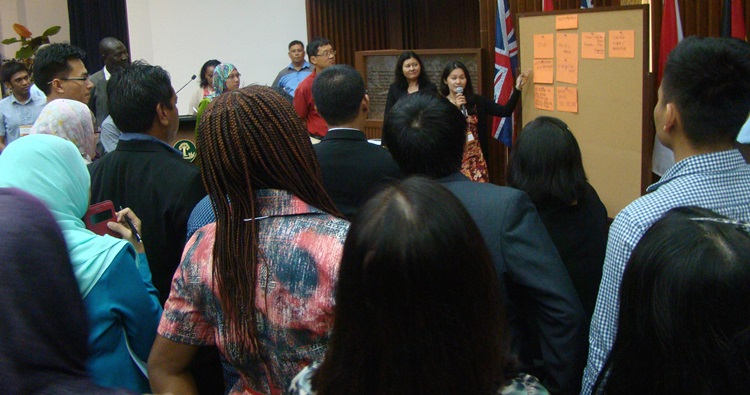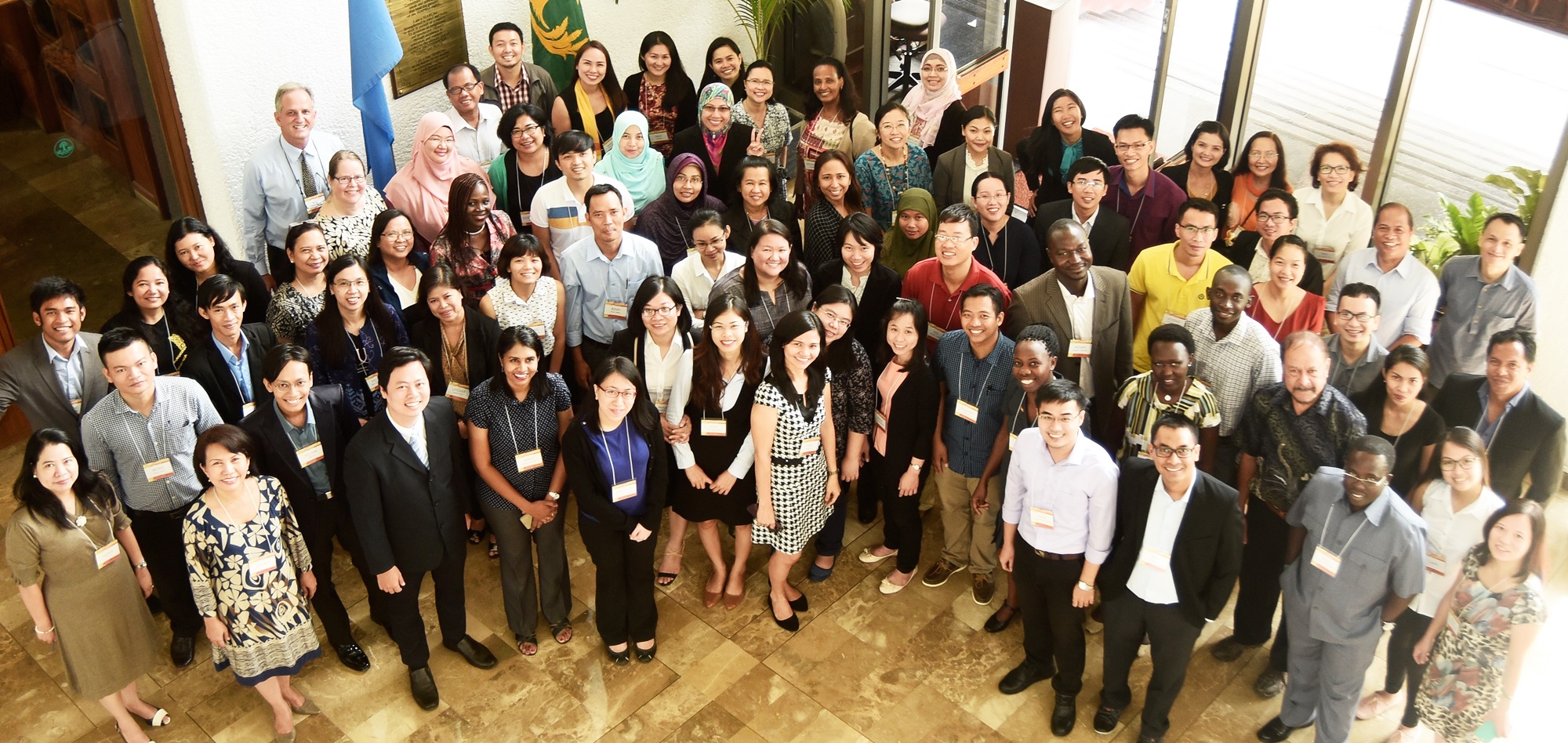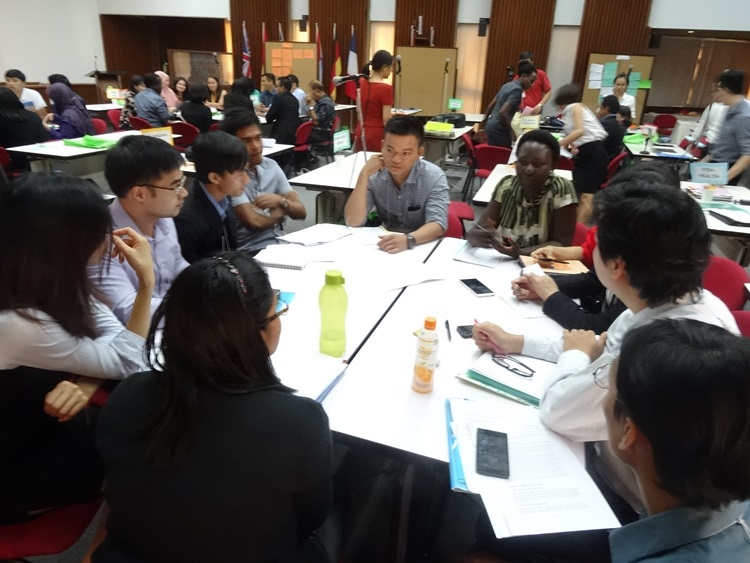This summarizes an overriding insight that 55 early-career scientists from eight Southeast Asian countries drew from a workshop on collaborative research to jointly improve on their respective team proposals on climate change adaptation and mitigation in agriculture for submission to a research grants program. Jointly organized by the Southeast Asian Regional Center for Graduate Study and Research in Agriculture (SEARCA) and the International Foundation for Science (IFS), the workshop on collaborative research aimed to develop the capacity of the participants from 18 eligible teams from the region who will compete for limited IFS-SEARCA Collaborative Research Grants.
Held from August 30, 2016 to September 1, 2016 at SEARCA, College, Los Baños, Laguna, Philippines, the workshop gathered 55 out of 64 eligible participants from Cambodia, Indonesia, Malaysia, Myanmar, the Philippines, Thailand, Timor Leste, and Vietnam, with six mentors from the first and second pilots of the IFS collaborative research grants program in Africa, three IFS facilitators and resource persons, and SEARCA’s three resource persons and a host of organizers. From among more than 300 eligible aspirants who expressed interest in submitting grant applications, these 18 teams were invited to the workshop to build their capacity in collaborative research. Six African mentors from Burkina Faso, Ghana, Nigeria, Tanzania, and Uganda shared their practical experiences and insights as successful grantees of the IFS collaborative research grants in their region, and sat with the Southeast Asian research teams in scrutinizing the concepts and science inputs discussed, as well as the teams’ proposals to be submitted to the IFS-SEARCA grants program for Southeast Asia launched in January 2016.
Dr. Nighisty Ghezae, IFS Director, said that the workshop primarily aimed to give the participants an opportunity to learn more about climate change adaptation and mitigation, and working in collaborative research teams. “Work harder if you want to get a research grant,” she challenged the aspirants. “Not everybody will get a grant…it’s a competition.” Accompanying Dr. Ghezae during the workshop was Ms. Annika Eriksson, Administrator on Animal Production and Aquatic Resources of the IFS. She supported participants during the mentoring sessions since their concerns focused partly on technical issues like using the online application system. Dr. Ghezae and other resource persons handled matters regarding research issues, including project budgets and work planning.
Dr. Ghezae assured the participants that IFS and SEARCA will always be available to help, because “your success is our success.” She reiterated that regardless of knowledge and position, participants, mentors, and advisers should look at each other as equals. “We are here together for a common cause – to solve critical global problems,” she said.
On SEARCA’s part, Dr. Gil C. Saguiguit, Jr., Director, emphasized the role of the workshop and grants program in his Center’s commitment to building research capacity in agricultural and rural development in Southeast Asia. He expressed hope to further its collaboration with IFS in this quest, which Dr. Ghezae of IFS affirmed.

Elaborating on the collaboration theme of the event during the workshop, Dr. Bessie M. Burgos, SEARCA Program Head for Research and Development, explained in a slide presentation that this collaboration started in August of last year and is expected to be completed by December 2019. As the workshop closed, she reminded participants about the important elements of teamwork, namely, Thankfulness for the partnership and Trust in fellow team members; Enjoyment of the research comradeship; Accountability in utilizing the research grant; finding of Meaning in the collaborative research endeavor; striving for Win-win courses of action; Out-of the box thinking; Reaching out to team members, mentors, relevant networks and institutions, and IFS and SEARCA; and Keeping it simple and succinct (KISS) in communicating research ideas and outputs.
As collaboration is key for the participants to meet the scientific standards of the research grant, Mr. William E. Savage, workshop facilitator, explained that to reinforce this, day 1 aimed at familiarizing the participants with each other because “they’ve only been working at a distance over the digital platform” called Chatter. He said this workshop on collaborative research will enable participants to “explore different kinds of concepts, working across various disciplines to bring about collaboration.” At the end of the workshop, he shared his observation of how the participating research teams, totaling 18 from Southeast Asia, evolved and gelled in their teamwork. “Most of the comments were about people learning how to work together, not only about science or research,” he said.
To provide in-depth analyses and recommendations, key resource speakers for the event were Dr. Julian Gonsalves, research leader and adviser of the CGIAR Research Program on Climate Change, Agriculture and Food Security (CCAFS) and a Senior Adviser at the International Institute for Rural Reconstruction (IIRR); and Dr. Rodel Lasco, the Philippines Coordinator of the World Agroforestry Centre (ICRAF) and Scientific Director of the Oscar M. Lopez (OML) Center. Dr. Lasco is an IFS alumnus who enjoyed research support from the Foundation in the 1980s.
In their presentations, Dr. Gonsalves and Dr. Lasco stressed the need for further collaboration and analysis to provide “tailor-made” solutions that would enable localized and better adaptation and mitigation policies per locality. Dr. Gonsalves enumerated the need to “diversify, intensify and integrate.” He pointed out that researchers and scientists “can’t romanticize indigenous knowledge.”
For his part, Dr. Lasco called on all participants to adapt now. “We need to do good research on (climate) adaptation and mitigation,” he emphasized.
The workshop ended on a high note – literally, as all attendees, gathered in a circle, linked hands and enthusiastically sang If We Hold On Together, theme song from the movie Land Before Time. Aptly chosen, the song further reinforced the need for continuous collaboration between all the attendees in future endeavors. (Dennis Rodel G. Santiago, Maria Celeste H. Cadiz, and IFS partners)

